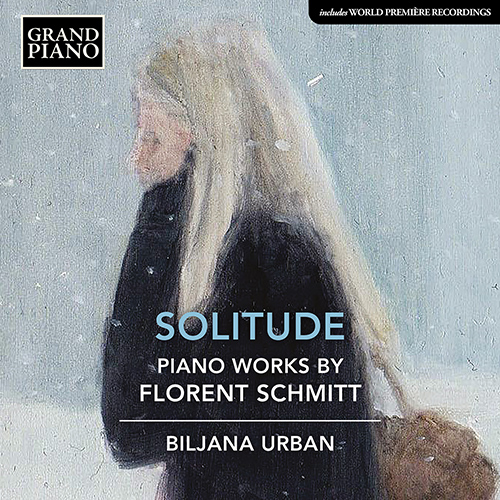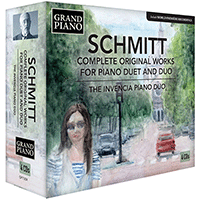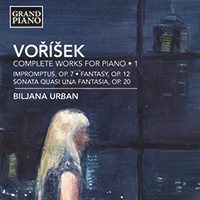
About this Release
“It has been an extraordinary adventure to bring to life Florent Schmitt's unknown piano pieces. A contemporary of Debussy and Ravel, Schmitt was a prominent figure of the Golden Age of French music, during which a pluralism of styles – Romanticism, Impressionism, Symbolism, Cubism, Ballet Russes, Orientalism etc. – influenced his prolific output. I chose Opus 27 for its tender musical expression reminiscent of Schmitt's mentor, Gabriel Fauré. Chanson melancolique, Romance sans paroles, Sicilienne, and Op. 3, Prelude triste all express Faurè-like eloquence of reticence and the power of pianissimo. This album is dedicated to the memory of my beloved mother who, since my childhood, kindled in me a love for “douce France”.” — Biljana Urban
SCHMITT, FLORENT (1870–1958)
Piano Works
- Biljana Urban, piano
Florent Schmitt was a strikingly original composer whose influences were as varied as his own restless and imaginative music. A number of his solo piano works are little known and offer an important insight into his compositional development. Neuf Pièces, Op. 27, which includes a Spanish-infused Gitanella movement, was composed during his first period of travel. The expressive and vivid elements of Crépuscules, Op. 56 are infused with harmonic richness and quiet melancholy, while Ritournelle, Op. 2 No. IIbis displays an airiness and wit characteristic of French music of the Roaring Twenties. Internationally renowned pianist, Biljana Urban, presents a selection of neglected gems of French piano literature including many world première recordings.
This recording was made on a modern instrument: Steinway, Model D
Tracklist
|
Crépuscules, Op. 56 (1911) (00:17:00 )
|
|
1
I. Sur un vieux petit cimetière (00:05:53)
|
|
2
II. Neige (00:03:07)
|
|
3
III. Sylphides (00:02:44)
|
|
4
IV. Solitude (00:05:47)
|
|
Pupazzi, Op. 36 (1907) (00:17:00 )
|
|
5
I. Scaramouche (00:02:26)
|
|
6
II. Aminte (00:01:51)
|
|
7
III. Damis (00:02:17)
|
|
8
IV. Eglé (00:02:07)
|
|
9
V. Cassandre (00:01:52)
|
|
10
VI. Atys (00:01:19)
|
|
11
VII. Clymène (00:02:09)
|
|
12
VIII. Arlequin (00:02:36)
|
|
9 Pieces, Op. 27 (1903) (00:27:00 )
|
|
13
No. 1. L'Heure immobile (00:02:24)
|
|
14
No. 2. Danse orientale (00:04:19)
|
|
15
No. 3. Chanson tendre (00:02:05)
|
|
16
No. 4. Chanson mélancolique (00:02:06)
|
|
17
No. 5. Nocturne (00:03:33)
|
|
18
No. 6. Romance sans paroles (00:02:26)
|
|
19
No. 7. Sérénade antique (00:03:30)
|
|
20
No. 8. Gitanella (00:03:06)
|
|
21
No. 9. Sicilienne (00:02:50)
|
|
22
Ritournelle, Op. 2, No. 2bis (1925) (00:01:40)
|
|
23
3 Preludes, Op. 3: No. 1. Prélude triste (1895) (00:03:54)
|
|
24
Ballade de la neige, Op. 6 (1896) (00:04:06)
|
The Artist(s)
 Biljana Urban comes from a family with a rich musical tradition. Her Czechborn grandfather, Jan Urban (1875–1952), was a composer and conductor. Biljana Urban received her Ph.D. in Music (Piano Performance) summa cum laude from the Academy of Music in Zagreb, and has an international career, appearing in such venues as the Fresno Concert Hall, California, and taking part in international music festivals. As a chamber musician she has performed with soloists of the Royal Concertgebouw Orchestra, the Monnaie Orchestra, Brussels, and the Prague Philharmonic Orchestra. Her recitals have been broadcast by radio and television companies in France, the Netherlands, Belgium, Croatia, Slovenia and the United States. Her three recordings of Jan Hugo Vorišek’s Complete Works for Piano met critical acclaim, with Vol. 1 included in Culture Catch’s Best new classical albums of 2014.
Biljana Urban comes from a family with a rich musical tradition. Her Czechborn grandfather, Jan Urban (1875–1952), was a composer and conductor. Biljana Urban received her Ph.D. in Music (Piano Performance) summa cum laude from the Academy of Music in Zagreb, and has an international career, appearing in such venues as the Fresno Concert Hall, California, and taking part in international music festivals. As a chamber musician she has performed with soloists of the Royal Concertgebouw Orchestra, the Monnaie Orchestra, Brussels, and the Prague Philharmonic Orchestra. Her recitals have been broadcast by radio and television companies in France, the Netherlands, Belgium, Croatia, Slovenia and the United States. Her three recordings of Jan Hugo Vorišek’s Complete Works for Piano met critical acclaim, with Vol. 1 included in Culture Catch’s Best new classical albums of 2014. The Composer(s)
 Florent Schmitt’s compositions are not easily categorised, and his compositional ethos, based on the requirements of the music or on the literary, historical or geographic source of inspiration, varied more in style than that of his contemporaries. From the age of seventeen, when he devoted himself to a career in music, Schmitt maintained his French musical lineage, incorporating as its essential element what he called “seductive harmony”. Yet his individual musical language gathered energy from all that he experienced. In spite of his connections to the music of his countrymen, Schmitt’s music avoids easy classification. He has been labelled a product of German romanticism, French sensibilities, exotic locales, Russian experimentalism, and orientalisms. In reality he is an independent, creative force to be reckoned with; one who made authentically original contributions to twentieth-century music.
Florent Schmitt’s compositions are not easily categorised, and his compositional ethos, based on the requirements of the music or on the literary, historical or geographic source of inspiration, varied more in style than that of his contemporaries. From the age of seventeen, when he devoted himself to a career in music, Schmitt maintained his French musical lineage, incorporating as its essential element what he called “seductive harmony”. Yet his individual musical language gathered energy from all that he experienced. In spite of his connections to the music of his countrymen, Schmitt’s music avoids easy classification. He has been labelled a product of German romanticism, French sensibilities, exotic locales, Russian experimentalism, and orientalisms. In reality he is an independent, creative force to be reckoned with; one who made authentically original contributions to twentieth-century music. Reviews

“Biljana Urban plays a piano of rare elegance, nuanced as possible, with refined resonances; in short, everything that is needed to arouse interest in this music and this composer who is still largely unknown.” – Classica
“Grand Piano continues to impress me with the quality of their recordings. I would like to see more from Urban. Her convincing way with this music would be most welcome in a continuing series of solo piano music.” – American Record Guide





 Grand Piano has gained a reputation for producing high quality recordings of rare keyboard gems. Dedicated to the exploration of undiscovered piano repertoire, the label specialises in complete cycles of piano works by many lesser-known composers, whose output might otherwise have remained unknown and unrecorded.
Grand Piano has gained a reputation for producing high quality recordings of rare keyboard gems. Dedicated to the exploration of undiscovered piano repertoire, the label specialises in complete cycles of piano works by many lesser-known composers, whose output might otherwise have remained unknown and unrecorded.






